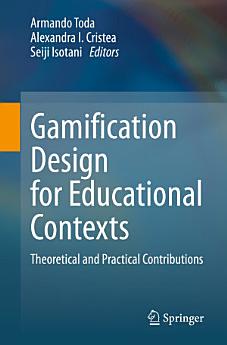Gamification Design for Educational Contexts: Theoretical and Practical Contributions
About this ebook
About the author
Armando Toda is a lecturer at the University of Sao Paulo, as well as a Postdoctoral Research Assistant at Durham University, and a Postdoc at the University of Sao Paulo. His research includes gamification applied to education, computational thinking, programming learning and training, human-computer interaction, software engineering, and artificial intelligence applied to education.
Alexandra Cristea is a Professor, Deputy Executive Dean of the Faculty of Science, Director of Research and Founder of the Artificial Intelligence in Human Systems research group in the Department of Computer Science at Durham University. Her research includes web science, learning analytics, user modelling and personalisation, semantic web, social web and, authoring.






